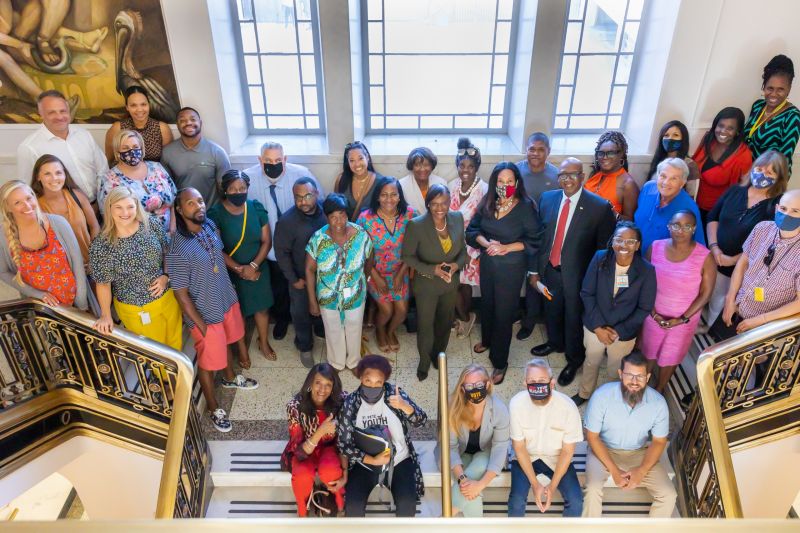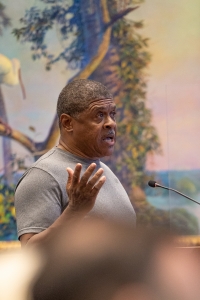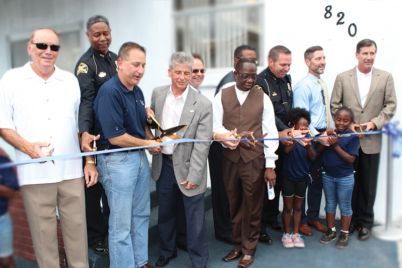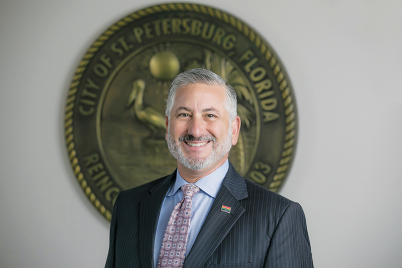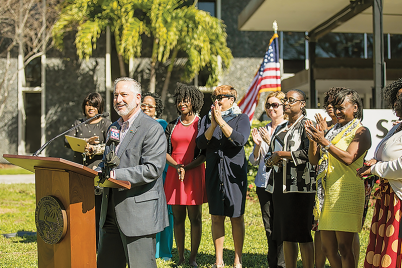Advocates after the unanimous vote to adopt the CBA Policy, with Deputy Mayor Dr. Kanika Tomalin (center, standing). Also visible are Councilmembers Amy Foster and Brandi Gabbard (left) and Lisa Wheeler-Bowman (far right), along with current mayoral candidate Ken Welch. Photos courtesy of All Photos Considered
BY GYPSY C. GALLARDO, Contributor
ST. PETERSBURG — It was a turnaround success when the St. Petersburg City Council voted unanimously last Thursday to adopt a long-hoped-for Community Benefits Agreement (CBA) Policy.
Just five months ago, the policy appeared “dead in the water,” in the words of one elected official after witnessing city council’s first public discussion on the topic at a Feb. 25 committee meeting that proved a rude awakening for CBA advocates.
Not only did they not have a majority of the council behind them (as they’d come to believe after a dozen meetings with councilmembers), but most members present did not even see the logic of what was proposed.
The advocates thought solid support turned out to be a mere three councilmembers in their corner – Deborah Figgs-Sanders, lead sponsor, Lisa Wheeler-Bowman, the policy’s original sponsor, and Amy Foster, steadfast champion of equity causes over the years.
Throughout the 50-minute meeting, council members cast doubt on every facet of the policy and on the work of advocates leading the charge. Several said they could readily support creating a CBA for the Tropicana Field Project but did not see the need for a citywide CBA ordinance.
In the months that followed, city staff went into high gear to re-sculpt the policy to address council’s concerns, while community advocates worked to coalesce what they knew was widespread support for the historic endeavor.
In the end, just after 6 p.m. last Thursday, July 22, the city council turned in a unanimous vote to adopt a citywide CBA Policy, making St. Petersburg the first city in Florida to do so.
Below is part of the story of how it happened.
United Offensive
One of the ingredients to success was that advocates stood their ground after the Feb. 25 shellacking. We were stunned but quickly regrouped with renewed determination.
We’d put in the work and would not be defeated by what we universally perceived as an attack from the rear by enemies of the policy who’d done the rounds to equip councilmembers with oppositional talking points.
Anyone listening to the Feb. 25 meeting might have justifiably come away with the impression that we were a disorganized group of activists attempting to rush a policy that had “wobbly legs” (in the words of one council member) and with insufficient engagement of the broader community.
During our debrief of the fiasco, we resolved that there would be no finger-pointing among the core team. “Not one inch of daylight between us!” one advocate declared.
Instead, we set in motion a strategy to reset the playing field. Our most ambassadorial members doubled back to meet one-to-one with councilmembers; our co-chairs did speaking engagements to shore up community awareness. We jointly initiated a media and advocacy program to rally visible support.
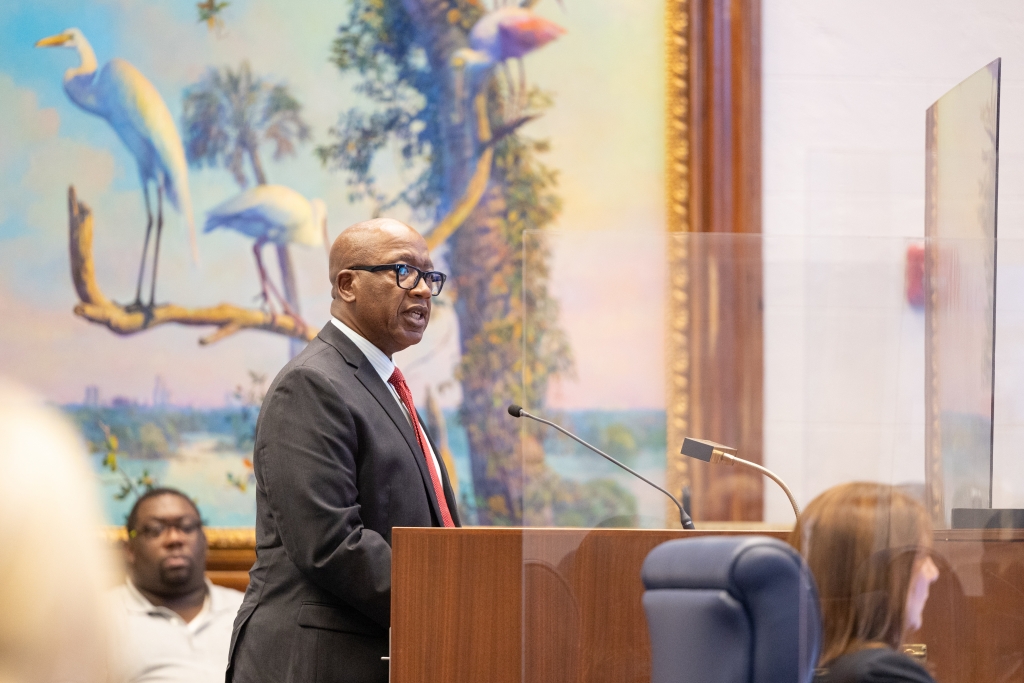
Mayoral candidate Ken Welch spoke in front of St. Pete City Council before they unanimously passed the Community Benefits Agreement. Photo courtesy of All Photos Considered
We also hosted a series of CBA Policy council meetings attended by 40+ diverse stakeholders providing input to the final policy design.
Meanwhile, city staff retrenched their talks with council members to integrate their suggestions into the next draft of the policy.
The community stood for this, and council listened!
Many have congratulated the core team that led advocacy for the CBA Policy, but let the record show that it was the strength of the community’s voice – raised to a roar at the divine right time – that ultimately turned the tide.
As one elected official predicted on the eve of the vote: “With the community standing up like it is, you may just get a unanimous yes.”
And that we did.
We give thanks to the councilmembers who did their homework, listened thoughtfully, and overcame their “fear” (as one council member put it last Thursday) to ultimately vote yes to a standing, citywide CBA Policy.
Several councilmembers clearly did their homework on the history of CBA approaches in cities across the nation and helped create a balanced, inclusive approach through their probing questions and enhancing suggestions. Kudos to Chairman Ed Montanari, Brandi Gabbard, and Darden Rice in this regard.
We give double honor and deepest gratitude to the hundreds of advocates who lent their voice and moral support to the cause.
The fact that four council members are on the ballot this year made it possible to powerfully leverage the strength of coalition advocacy. In this, the community’s support turned out to be the linchpin.
Our allies in the labor and political arenas kept the banner raised during candidate forums, resulting in mayoral candidate and Councilwoman Darden Rice going on the record in support of the CBA Policy at least twice (during forums by West Central Florida Federation of Labor and the Pinellas County Democratic Black Caucus).
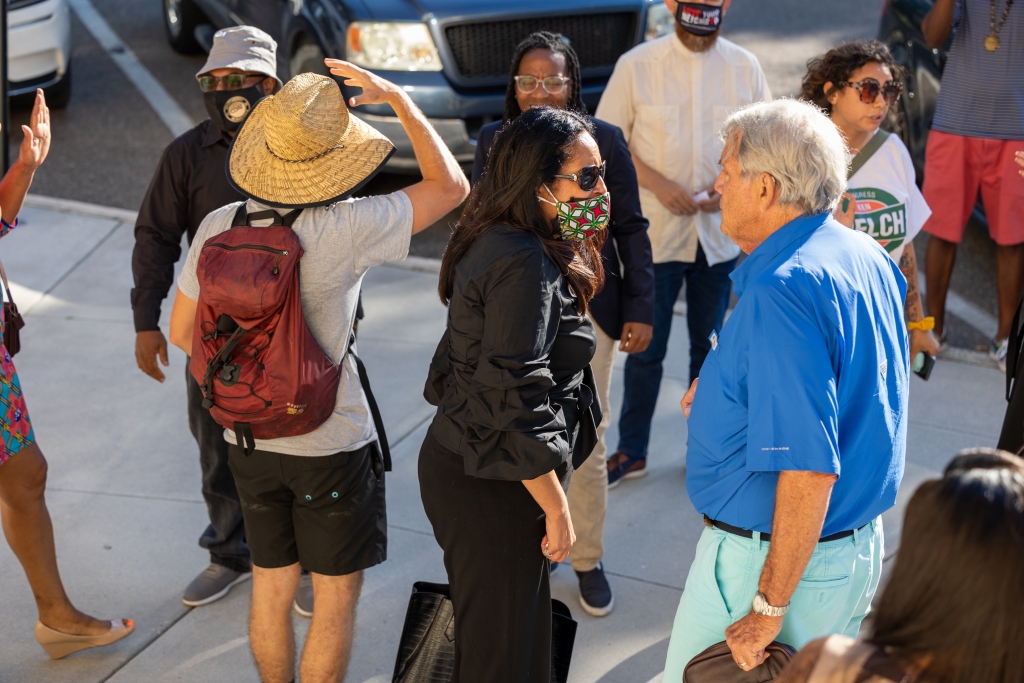
In front of City Hall, community advocates rejoiced after city council unanimously passed the Community Benefits Agreement last Thursday, July 22. Photo courtesy of All Photos Considered
Robert Blackmon, also a mayoral candidate and council member, seemed to signal his support during a televised forum in mid-July.
Over the weeks, more than 500 advocates backed an email drive that streamed into council’s inbox, strategically timed at two pivotal junctures.
The first email wave was in early March, during the lead-up and wake of Councilmember Amy Foster’s March 4 motion to move the CBA Policy out of committee for the full council to discuss; and the March 11 redo of Foster’s resolution, following a procedural challenge by Council Chair Montanari that invalidated the March 4 vote.
A crucial second wave of emails went in the days leading up to council’s final vote on the CBA ordinance on July 22.
The latter became all the more essential because, just days before, Councilmember Deborah-Figgs-Sanders (our lead champion and one of only four on-the-record Council supporters at the time) announced that she would be unavoidably absent for the July 22 hearing.
The news caused a moment of panic and speculation that the hearing should be canceled, but Figgs-Sanders insisted the show go on.
In that 11th hour, two dozen community leaders pitched in to raise support, including Theresa Jones, Renee Brown, Charlotte Anderson, Carolyn Lane, Dr. Ruth Whitney of NOW, Thelma Bruce of NCNW, and One Community affiliates such as Tahisia Scantling, Tiffany Moore, Angie Harris, Juan DaCosta, Roy James, and others. Special thanks to journalist Adam Smith for shining a light on points of contention during city council proceedings.
A directive from the top
I believe it was 2017 when we called on Mayor Rick Kriseman and Deputy Mayor Dr. Kanika Tomalin to mediate a long-smoldering disagreement between CBA advocates and city staff. The crux was staff pushback that the city already does community benefits in developer agreements (touting the now-defunct Commerce Park deals as examples), versus our contention that the city’s limited and loosely targeted benefit clauses with some developers did not constitute a CBA Policy.
At the mayor and deputy mayor’s bidding, city staff finally adopted a formal process for developing the CBA Policy. In her dual role as city administrator, the deputy mayor tasked staff with collaborating with community stakeholders to create a framework and draft.
The process may have stalled again if not for the intervention of Councilmember Figgs-Sanders, who embraced the nascent CBA Policy as one of her priorities once elected in 2019. She convened and jointly chaired (with Dr. Tomalin) a series of meetings that lassoed negotiations to a manageable form and pushed for a time certain when the policy would reach Council chambers.
Kudos to the staff who invested countless hours in the final product, principally Alan Delisle and Brian Caper.
Consensus overpowered disagreements
We often disagreed among the core group of five and ultimately 10 people who drove the last leg of the CBA campaign this spring and summer.
But we defaulted to consensus in every case. Our ability to do so came from a degree of trust developed over several years of working together.
The team celebrated the diverse views of their peers. Rather than jockeying for position, each member “gave what they had” to the process, readily yielding to make room for others to operate in their gifts.
- Tamara Felton-Howard, an experienced negotiator in high-stakes circumstances, never failed to steer disagreements toward sensible and elegant solutions.
- Che Smith of Raise the Bar, a seasoned organizer and conciliatory presence, led most meetings with Councilmembers and kept team meetings going, even during bouts of discouragement.
- Bruce Nissen, an activist academician, and retired professor, helped shape an ordinance approach (a notch above the unsuccessful strategy I proposed in 2015) and helped build “the case” that framed the campaign.
- John Muhammad, a visionary leader and co-founder of the New Deal, created an alliance with The 2020 Plan in 2017 that breathed new life into the CBA quest at a time when it was sputtering for traction.
- Esther Eugene, NAACP President, became a forthright voice at City Council meetings and an indispensable emissary in individual talks with Councilmembers.
- James Scott, easily the most intense personality at the table, engaged Sierra Club as a key ally in what became the city’s first successful “Black-Green” joint advocacy campaign.
- Dick Pierce of Eckerd ASPEC, a ferocious advocate and detail man, scrubbed every version of the policy and was first to raise the red flag that the Tropicana Field project would not be covered by the draft policy that aired in February.
My role was to use the power of the pen and past experience as a community organizer, working with many others behind the scenes. Raise the Bar’s Dan Kurczi helped shape political strategy; Erica Hall, Linda Hinton, and Cathy Harrelson activated Sierra Club advocates; Dr. Linda Lucas helped guide campaign messaging; Aaron Dietrich of SEIU supplied graphic designs, and the team at Foundation for a Healthy St. Pete hosted policy development meetings.
Clergy played a significant role. Rev. Louis Murphy helped initiate the CBA push in 2015 and spoke before council this spring. During the make-or-break last days, Rev. J.C. Pritchett privately influenced councilmembers and created a Tiger Bay forum to elevate the policy; and Rev. Manuel Sykes hosted a CBA radio panel and spoke powerfully at the July 22 hearing.
Elected officials lent their heft to the campaign in public remarks and private conversations with councilmembers, including State Senator Darryl Rouson, State Rep. Michele Rayner Goolsby, Pinellas County Commissioner Rene Flowers, who also raised awareness on social media, and former Commissioner and current mayoral candidate Ken Welch, who had taken a stance for the CBA Policy back in February and attended last week’s hearing in person to speak on our behalf.
What Next
Put in perspective, the new CBA Policy is merely one plank in a still skeletal framework for disrupting structural racism in the economy of St. Petersburg.
As I wrote last week, the CBA Policy applies to only a fraction of construction spending here each year. In the scheme of things, the City of St. Pete is doing its part to build new bridges to opportunity, but that only gets us so far to true inclusion in the broader economy.
And let us not forget that we have been down this road before. Large equity policy victories have invariably faltered or fallen short in St. Pete. A prime example is the city’s Minority Business Enterprise (MBE) Program, which was disbanded in 1999 after two failed attempts to meet MBE contracting goals for Tropicana Field.
It will be imperative that allies create an infrastructure for accountability to the CBA Policy and other equity initiatives in the days ahead. Watch for updates on an Equity Council whose members represent groups that supported the CBA Policy’s passage and made history in the process.

